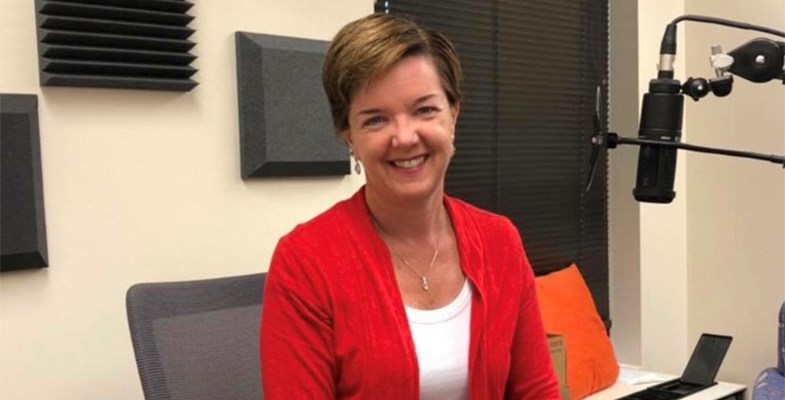Christy Kovel, Director of Public Policy for the Alzheimer’s Association Connecticut Chapter, shares her own story of “Life After Loss.” Christy lost her partner of 20 years after a long illness. While being public about her loss—speaking at public venues and helping her local hospital start a new support group—Christy takes us on her personal journey as a younger widow who is remaining open and moving forward.
Show Transcript
Rosanne Azarian: Welcome to Front Door, a My Place CT Podcast. My Place CT is a free web-based resource from the State of Connecticut that helps people live life independently. Learn more at myplacect.org.
Hi, I’m Roseanne Azarian, the host of Front Door, where older adults, people with disabilities and the professionals who help support them come for information and inspiration.
Subscribe to Front Door on iTunes or the Apple Podcast app, Stitcher, Google Play or wherever you get your podcasts. Front Door is a production of the Connecticut Department of Social Services and Mintz + Hoke.
What’s life like after the loss of a life partner? Does it change who you are? Does it change how you live your life? Joining us is our guest Christy Kovel to share her story. What makes Christy’s story unique is that she became a widow in her 40’s. Now some of you may know Christy in her role as the Director of Public Policy for the Alzheimer’s Association of Connecticut. But today Kristy is here to share her personal story about loss, life and widowhood. Christy, welcome to Front Door.
Christy Kovel: Thank you so much. I appreciate it.
Roseanne: We’re happy to have you here. First, I want to say I’m very sorry for your loss.
Christy: Thank you.
Roseanne: Tell me a little bit about your journey.
Christy: I was married for 20 years. My husband Tracy and I met right after college, and you know, everything was sort of going along perfectly—we got married, we had jobs, we both went to graduate school, we bought a house. And ten years into our marriage, he was diagnosed with a very rare form of testicular cancer.
At the time, it was ruled that, you know, chemotherapy was not going to be effective. So, he had it removed and for a period of time he was okay, and then it came back five years later, and then subsequently, I sort of was going through this five-year journey with him that many people do, where there’s chemotherapy and treatments and all sorts of other things, and he passed away just over two years ago, after our 20-year anniversary.
Roseanne: Wow. Hmm, that’s a lot. Christy, what’s unique about being younger and losing a spouse?
Christy: I was 46 when Tracy passed away, and it’s a very unique position for me because I had had a long marriage, and so I’m now looking at sort of the rest of my life, you know, sort of like, what’s next? Many people in my situation, you know, either they have children or they’re, you’re trying to sort of put it back together, and it’s a real disruption—that’s the best way to, it’s not what you planned. So, it really changes the course of absolutely everything.
Roseanne: It’s tough to lose someone when you’re in the middle ages. According to George Bonanno, a leader in the study of grief and trauma, it’s when you have maximum engagement in the world, and it’s hard at that zenith to have this happen.
Christy: It is, and that I think is sort of the unique position that I was put into because, you know, my career was on this path and all sorts of things were sort of … you know, we were homeowners and all sorts of things were happening, and then all of a sudden you were this established person, married, and then everything is turned upside down.
Roseanne: How did you start putting your life back together?
Christy: That’s a good question. Putting your life back together—I think one of the things people should know is that if you lose a partner, you’re putting it back together so to speak, but it’s not going to resemble what it once was. So, for me, I began looking around in my area for support, and I wasn’t finding a lot.
You know, I did attend a support group in my town. Many of the people there were older and had had a substantially longer marriage. So, some of the issues that I was facing in terms of thinking about selling my house, or you know, possibly dating again, or things like that—it’s not relatable. What I found for me that was helpful was finding some supports online and meeting up with people here in Connecticut that were also in a similar situation.
Roseanne: How about individual therapy, or exercise, or meditation?
Christy: Oh, absolutely—I mean all of those things. So, for me, you know, I chose counseling, which you know, I continue to go to as I need to. Exercise is really important. Endorphins really help with the grief process. So, for me, that’s a combination of walking, sometimes running, yoga, meditation, you know, all of those things—and really trying to take care of yourself. I think what, you know, it’s important to know is that if you’re going through this journey, it’s important to take care of yourself because things like sleep and diet and exercise all will help you.
Roseanne: Absolutely. In any situation that’s a challenge, but especially in this situation.
Christy: It is. It is.
Roseanne: What was life like in your first year without Tracy?
Christy: So, I think the best description that I could describe that it’s a giant fog. You are, you know, you’re living your life but you’re sort of living your life in a very detached way. You are not in touch with your emotions, like your emotions are all over the place, which was frustrating. Once I realized that that was the way my life was going to be, I sort of embraced it. But you could be upset and crying about something in the morning, then you’re going to work, and then you feel fine the rest of the day. I mean it just, it’s all over the map.
But you have all of those milestones the first year that people talk about. So, things like the holidays, anniversary, birthdays—all of those things. And so, for me, I looked at the calendar in the first year of sort of how to get through it, and that’s what most people seem to do.
Roseanne: I want to know, even in that first year, what about the daily reminders—maybe a restaurant that you always went to, or a coffee shop that you stopped by on Saturday afternoons after all your chores or errands were done? How did you deal with that?
Christy: So, I think for me it, some, it took some time for some things. You know, there was a favorite bar and restaurant, you know, in Middletown that I loved going to. We had our engagement there and things like that. And it took several months before I was able to go back there. And once I went back there, though, it was sort of a feeling of triumph.
You know, I think reminders, Sunday afternoons we used to cook together all the time and, you know, when spring came, you know, I chose to put in a garden. But it felt a little odd because the garden was Tracy’s thing, not mine, although I had a really nice garden in the first year. But it’s those sort of things that are actually harder than some of the bigger things that you think would be a problem.
Roseanne: I think so, and I think they can stay with you a long time. But it’s almost like you’re reclaiming that place for you at this point in your life.
Christy: You are, and you’re sort of reframing it. So, for me, I still now go back to this particular restaurant. I’ve opted not to have another garden, you know, for the time being. But there’s also new things. So, I think, you know, there’s things that were a part of what I always call my old life or my former life that no longer work for me. But there’s a lot of new things that I do that I really enjoy.
Roseanne: So, from the first year when you’re in this deep fog, to the second year, did it get easier?
Christy: You know, I think it does. There are other folks that I’ve met that always say the second year is harder. And I, for me, I disagree with that. The second year generally is easy because I did not enjoy going through life in a giant fog.
What’s challenging about the second year is this sort of sense of permanence—that this is really how your life is going to be. I think in the first year you’re focused so much on just day-to-day survival, you know, and so the second year you’re sort of looking at some life changes, like okay, this is another holiday without my husband—like what worked last year, is that going to work this year? Or maybe there’s a job change or a decision about where you live, or all those things, and you’re doing these things without your spouse.
Roseanne: But it also feels as though a support system that you have in place in your first year—folks come around and they’re checking in on you, perhaps during the holiday time or throughout the year—but then in that second year did you find that that was less so? People resume their normal, you know, they have their own focus and kind of you seem fine and you’re working and…what happened?
Christy: It does. You know, there are people that tend to drop off, and they really show up the first year with all sorts of things, and they’re very mindful of your loss. And you know, people have their own lives to lead. So, I think, you know, there were some points in the second year that I, you know, felt really not in a good place, and I realized I needed to reach out and ask for some help.
Roseanne: Before we dig into this topic a bit more, let’s take a break and we’ll be back with Christy Kovel after this.
Anncr: Please be sure to subscribe to Front Door on iTunes or the Apple Podcast app, Stitcher, Google Play or wherever you get your podcasts. Tell us if you like what you hear and write a review.
Roseanne: We’re back with my guest Christy Kovel.
Many people don’t like to ask for help, even when they need it. What advice can you share?
Christy: So, I think, for anybody experiencing a loss, is to absolutely get over that immediately. Ask for anything you need because people want to help. And I think, for people that have somebody in their life that has lost a partner, offer tangible things. You know, “Hey, can I come over? I’ll mow your lawn next week.” Or, “Do you need me to pick up the kids?” Or, “How about I bring dinner to you on Thursday?”
It’s offering those tangible things because, you know, that phrase, “Let me know if you need anything”…to hear that, while it’s well intentioned, you’re in such a fog, you can’t actually say what you need. So, it’s better if people suggest to you things that could be helpful and you could say yes or no.
Roseanne: Also, I think there’s more sincerity to it, though quite honestly, you don’t know what to say sometimes, or you don’t want to in any way have a person feel like they’re less than independent. But offering a specific seems to take away some of that.
Christy: And it can be phrased to, you know, like, “Will dinner next Thursday be helpful to you?” I mean, nobody can be offended if it’s asked in a certain way.
Roseanne: Absolutely not.
Christy: And I just want to add that, you know, people always are uncomfortable because they say they don’t know what to say to somebody who’s had a loss. And you know, really what it is, is you can never say the wrong thing if you say something, if you show up and are present for them, and you just say, you can say something as simple as, “I’m here for you.” You can say, “I’m sorry for your loss.” You know, people want to connect. They want to feel that connection. So, people shouldn’t avoid somebody because they’ve gone through a loss.
Roseanne: What can you offer to someone who is facing the loss of a loved one? What can you tell them about this journey that you’re now living your life with that behind you? What…?
Christy: So, I think if somebody is facing this sudden loss, to recognize that it takes time. It’s a process, and I think, you know, that they need to take care of themselves—that once the person in their life passes, they’re sort of in a new life now, and so it’s about whatever is going to be helpful to them in terms of, you know, getting supports lined up, family, friends, counseling, support groups if that’s something that is beneficial—anything that can be helpful to them—and recognize that you don’t want to go and do this alone.
The tendency because you are feeling such a strong state of loss is to isolate, and while you may need some periods of time to seek solitude because you may be feeling bad, for me it was going out and seeking the support of others that always made me feel better.
Roseanne: You mentioned resources online. Was there any one or two in particular that you would recommend?
Christy: So, for me I found, on Facebook there are some groups, and they’re closed groups, that are really beneficial. You know, they have thousands of members that post in them. And it’s very interesting because with social media, people are posting everything from dates to trying to get through the day, to here’s what happened to me, and just reading those stories is really helpful, so you’re not feeling, you know, obligated to participate in some way. I found that very helpful. And also, for me, I worked with my local hospital to start a young widow support group, which has been enormously helpful.
Roseanne: That’s excellent. And is it something that you came up with that idea of looking out and saying, gee, there’s not enough resources for younger people?
Christy: There is. And you know, I really felt that I needed to sit with people in my own peer group because there’s really a difference between somebody in their thirties and forties who’s lost a partner versus somebody who’s in their, you know, seventies or eighties. And it can, you can share similarities but in terms of how you’re moving forward with the rest of your life, it’s very, very different.
Roseanne: So, Christy, is it all about looking forward, not looking back?
Christy: It absolutely is. Yes, it absolutely is. It’s all about sort of looking forward and, you know, planning, you’re not planning for your life cause you’re sort of looking ahead and making the best decisions and sort of being open to whatever those new experiences are, whether you know, since Tracy has passed away I’ve changed jobs, I’m about to change residence, and you know, there’s all these changes that are now happening without him. But it’s all about sort of looking forward and looking forward to the future.
Roseanne: I just have one question. The people who mean well…have people come up to you and suggested, “Oh, why aren’t you dating?” Or, “How about going out…maybe you’ll meet somebody.” Do you have that happen to you or…?
Christy: Yeah, I absolutely do. It’s happened. You know, and in terms of that, I think it’s well intentioned and, you know, people want to sort of think that you’re okay and I think we naturally think that someone’s going to be okay if they’re paired up with somebody again. And you know, while that may happen, you know, that’s not the actual solution to this ‘cause you’re sort of living with grief for the rest of your life. It just is going to manifest itself in different ways and you may be engaging in the world in a different way.
Roseanne: But it’s interesting, the title of this particular podcast is Life After Loss. And it feels to me that while no one can take the place of your husband, you are living your life the best you can. I think that’s the best testament to moving forward, and that’s very inspiring. Thank you.
Christy: Thank you so much for having me.
Roseanne: Thanks so much for listening to Front Door, a My Place CT Podcast. Please subscribe, rate or review the show on iTunes. And you can access all the episodes as well as transcripts and the show link at myplacect.org. Stop by Front Door for our next episode. And remember, our door is always open.
Anncr: Front Door is a production of the Connecticut Department of Social Services and Mintz + Hoke.
My Place CT is the virtual home of No Wrong Door.





